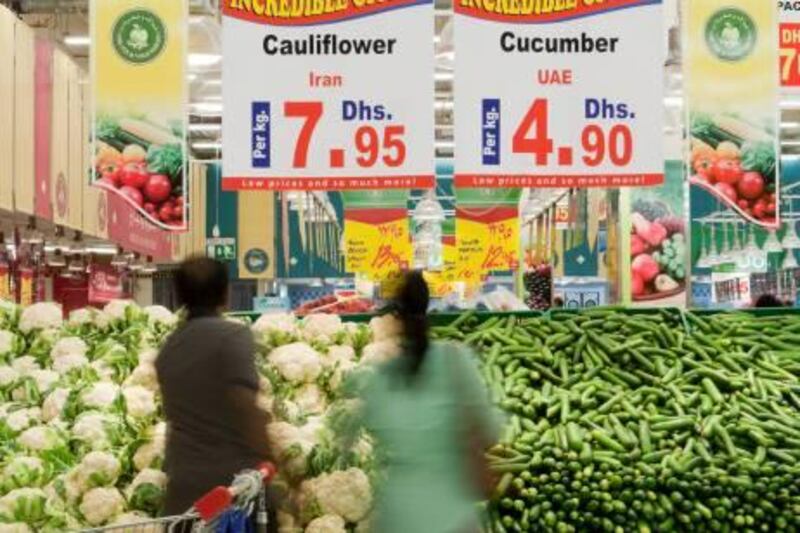DUBAI //In the wake of an e-coli outbreak that has killed some 50 people in Europe this year, Dubai is enforcing tougher food safety rules starting at the source.
Video:Families react to rising food prices
The parents, UAE residents from different ethnic backgrounds, talk about feeding their families as the contents of their shopping trolleys rise.
The move comes as a new report by the municipality's Food Control Department lays the groundwork for potential laws and policies to assure food safety in the emirate.
Much is at stake: last year, Dubai imported 85 per cent of its food, almost 5.7 million tonnes from 163 countries.
"Because the UAE, and Dubai in particular, depend on imported goods to a large extent, the logical way to control food is not to wait until it comes here, but to control it at the farm at the source," said Bashir Hassan Yousif, the food safety expert at the municipality.
He played a key role in compiling data for the new report.
Bobby Krishna, senior food studies and surveys officer for the Food Control Department, said stronger food safety at the source is good business, because it will reduce the need to reject food as unsafe after its arrival in the UAE.
The new report highlights the challenges facing Dubai, including collaboration between federal and local authorities, changes in consumer habits, protecting consumers from different contaminants and publicising the results of inspection visits.
The report is being distributed to food control authorities, consulates and companies.
"We will use the report for drafting strategies to control imported foods and even food which is locally manufactured," Mr Yousif said. "We not only concentrate on the amount of import but link it to the type of food and contaminants, and whether or not they are significant."
The Food Control Department rejected a little more than 432,000 tonnes of food last year, up 5.7 per cent from 2009. Officials attributed it to a stricter attitude.
"Food security is fundamentally about consumer health," Mr Krishna said.
"This type of data can have a massive effect on countries that are poor. Say, for example, if Dubai stops importing food from Country X [which is] dependent on our imports, it could have serious effects so decisions have to be very careful and not just about blanket bans."
Programmes such as the Person In Charge (PIC), introduced by the municipality, ensure a trained individual acts as a liaison between food establishments, importers and traders to develop communication, safety and hygiene.
Some 13,761 food establishments were registered in Dubai last year, which includes around 5,700 retail outlets, 2,000 of which now have a certified PIC. Training for some of the 6,000-7,000 traders is set to begin soon.
Nihal Dhurat, the area operations manager for Hotbrands International, said programmes such as PIC are essential for his company, which operates restaurant chains and has 300-plus staff.
"We will have at least 50 certified trainers including myself," he said. "It has made us more aware of municipality requirements which are more strict and with good reason. The report also offers great feedback so that companies like ourselves continue to source safe products from the right suppliers."
Last year, Dubai's Food Control Department conducted 34,726 inspection visits and reported a 45 per cent decrease in the number of violations since 2009. The most common violation was related to occupational health cards, followed by displaying expired foods and general cleanliness.
Some 97 establishments were temporarily closed in 2010, compared to 191 in 2009.
Top five food importers to Dubai
- India
- Pakistan
- China
- Brazil
- United States
Five most imported products to Dubai
- Grains
- Fruits
- Vegetables
- Pulses
- Meat and poultry
Source: Dubai Municipality






